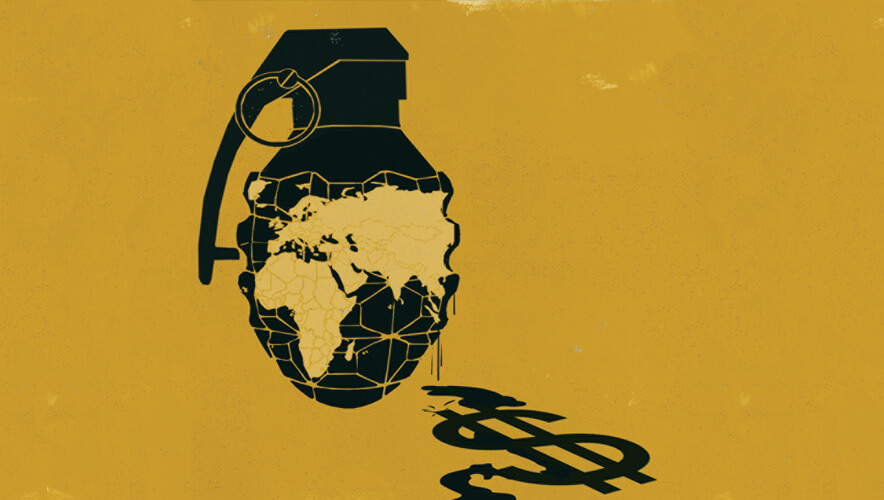Defense Corruption
Corruption, among its other pernicious effects, puts international security at risk. Corruption contributes to arms proliferation and the infiltration of organized crime into the security sector, and so it can be thought of as an enabler of conflict. The problem is especially marked—and potentially explosive—in the Middle East and North Africa (MENA), as a new report by Transparency International (TI) demonstrates.
The MENA region contains some of the fastest growing defense budgets in the world. The countries examined in the report—Algeria, Bahrain, Egypt, Iran, Iraq, Jordan, Kuwait, Lebanon, Libya, Morocco, Oman, Qatar, Saudi Arabia, Syria, Tunisia, Yemen, and the UAE—devoted more than $135 billion to military expenditures in 2014. Moreover, the region's military spending as a percentage of Gross Domestic Product (GDP) is the highest of any region in the world, with the countries spending an average of 5.1 percent of GDP on defense in 2014. In many cases, defense spending is an even greater proportion of overall spending; in Saudi Arabia, for example, 30 percent of the government's budget goes toward defense.
But despite all this spending, a state's ability to fulfill its primary obligation—protecting its citizenry—is eroded by defense corruption. And so the TI report is aimed at identifying how corruption and the lack of accountability affects the prospects for security across the MENA region.
All of the countries in the report were ranked on a risk of corruption scale, and none fared well. Tunisia received a D grade, which corresponds to high corruption risk. Iran, Jordan, Lebanon, the UAE, and Saudi Arabia received E grades, denoting very high corruption risk. The remaining 11 countries received an F grade, for critical corruption risk.
Underlying these low grades were many specific problems hindering security. First, most of the countries in the region lack a strategic and transparent plan to ensure that the government is investing wisely in national security. Instead, high-ranking defense officials control and conduct purchasing with very little oversight.
Second, defense vulnerabilities due to corruption—even in countries with well-funded and seemingly strong militaries—remain high. Because of factors like nepotism, increases in defense spending are not going toward equipment that meets true strategic security needs, the report found.
Third, corruption is feeding the increased proliferation of arms, a problem that is exacerbated by weak export control systems.
Fourth, corruption is diminishing public trust and state legitimacy in MENA countries. This could have a devastating impact; when governments are not regarded as trustworthy and legitimate, political unrest and extremism can flower.
The authors of the report also cautioned the leaders of countries that export arms or other advanced defense technology into the region. "With few institutional checks and balances, the risk of arms proliferating across the region is extremely high," the authors write. "The combination of rising arms imports, weak oversight and controls on strategy and spending, and low public engagement is dangerous."
Western companies sending products to the region must obtain a license to export there. Although the licensing process is designed to prevent exports being used for illegitimate purposes, the system is highly imperfect, so exporters need to be careful and do their due diligence, says Katherine Dixon, head of the defense and security program at Transparency International UK, and one of the authors of the report.
"Clearly there is reputational risk for a company," she told Security Management in an interview from TI's London offices.
Despite export controls, arms imports to the region have increased substantially. States in the Gulf Cooperation Council (GCC) have increased their arms imports by 71 percent in the last decade; Saudi Arabia made the world's largest spending increase (17 percent) for arms imports between 2010 and 2015.
The MENA region is also a leader in another troubling category: opaque defense spending. Roughly $120 billion of the region's defense received no independent scrutiny. No legislature received detailed information on defense spending. In fact, with the exception of Jordan and Tunisia, none of the MENA countries even publish their defense budgets. At most, some provide vague aggregated figures. And none of the countries have legislative defense committees that can meaningfully influence spending, the report found.
However, the authors of the report did find some potential bright spots, in the form of existing institutions that could be strengthened and built upon to increase accountability and decrease vulnerabilities. Lebanon, Kuwait, and Tunisia all have formal provisions for independent legislative critiques of defense spending. Following through on those provisions with independent committees that have access to information would build accountability, the authors write.
In Iraq, a member of parliament raised questions about corruption in the purchase of military aircraft. Report authors recommend that Iraq allow its legislative committees to investigate such allegations, call witnesses, and initiate legal cases in such circumstances.
Saudi Arabia has created Nazaha, the Commission of Integrity. The report recommends that the commission's mandate be extended to explicitly cover defense, and that it be allowed to operate free of political interference.
In addition, Dixon mentioned that Tunisia improved its rating from an E in last year's report to a D in this year's model. Although the country still has a "not so brilliant" rating of high corruption risk, it has made progress after its transition to democracy in the last few years.
"Tunisia has jumped a band, which is really kind of a solid improvement," Dixon says.
